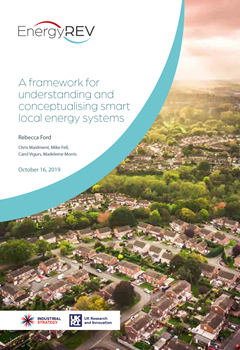Rebecca Ford, Chris Maidment, Mike Fell, Carol Vigurs, and Madeleine Morris
October 2020
Countries around the world are embarking on energy transitions to decarbonise their economies. Decentralised and digitised solutions are becoming an increasingly prevalent part of the landscape. But what these smart local energy systems (SLES) will look like, and the ways in which they will deliver benefits is unclear. Making sure we understand the process by which system and societal benefits can be delivered is key to making sure the full value of SLES can be unlocked.
We have developed a framework for understanding SLES, based on a meta-narrative review of the literature coupled with a series of interviews with researchers working in this area. This provides a structure within which SLES stakeholders can explore how their projects might deliver value, and in what context.
The framework can help develop a collective and shared understanding of how SLES can leverage both “smart” and “local” elements, within a system boundary, to deliver additional value and co-benefits to that locality. It also aims to make explicit the potential unintended consequences that may be realised, as well as the impact on the wider system and the interactions that may be present with other technical, social, environmental, financial, and regulatory systems.
Tags: Decentralisation; digitalisation; networks; policy; innovation; value; social; economic; environment; community; tool
